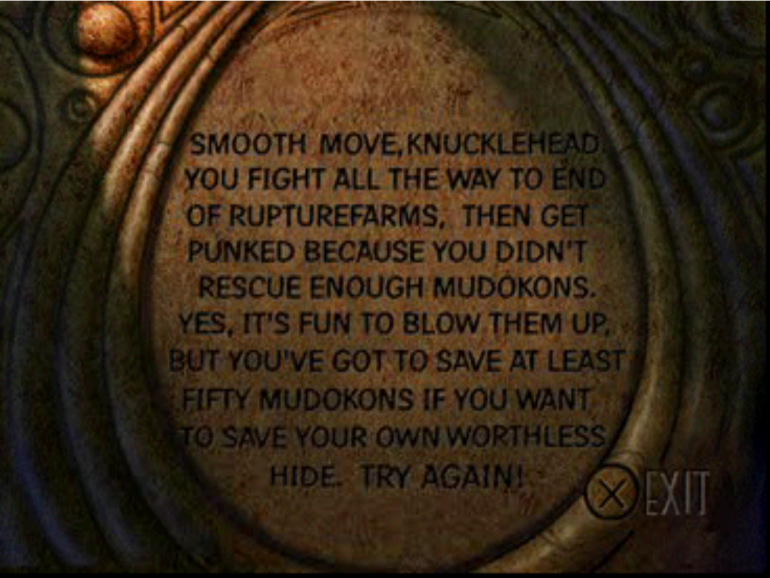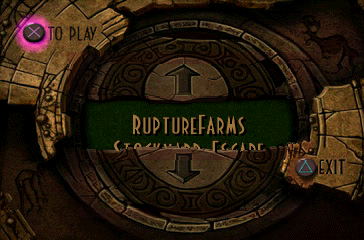I’m not very good at videogames. This, in and of itself, is not particularly noteworthy. However, as a game studies scholar, playing through videogames and documenting them is often a key part of my research process. When games skew a bit towards the difficult — such as with platformers and old-school action titles — gaming prowess can become a prerequisite for progressing and reaching certain objectives. This raises some interesting questions for game studies scholars: How much time should we spend getting better at a game? Is it necessary to beat a title completely (100%, “good” ending, etc.)? What tools should we allow ourselves to leverage in order to further our research?
These questions swirled through my head as I played through Oddworld: Abe’s Oddysee for the class and games research project. Considered a blistering difficult title upon its release, Abe’s Oddysee epitomizes a number of hardcore nineties game design philosophies. Trial-and-error puzzles mixed with pinpoint jumping and running challenges make some of the stages frustrating, and it is fully expected that Abe will die a thousand deaths before completing his quest. Thus, circumventing death become a research concern as I delved into the title. Although I would never advocate fully eliminating “traditional” playthrough for difficult games, I found it beneficial to seek out resources to help lessen my frustration and create new opportunities for my games scholarship.
Online Resources
In the pre/early-Internet days, getting stuck in a videogame often meant hours of frustration. Online walkthroughs and FAQs were difficult to find and official strategy guides could be quite expensive, making it tough to get guidance for challenging games. Nowadays, the Internet offers a wealth of resources to aid players who hit a brick wall in certain titles. Although FAQs and walkthroughs are still prominent resources — popularized by websites like GameFAQs and IGN — there are a bevy of other ways that researchers can ease or complement their own gameplay experiences. Stuck on a level or think you missed something in your original playthrough? You can simply load up a 100% longplay video — a recorded playthrough of a game that aims to complete every single objective — to view the game in its entirety. Need some additional information on the development of a title? Websites such as The Cutting Room Floor hack apart videogames to find unused and cut content, providing insight into alpha and beta builds of a game. Want to learn more about recurring elements in broader videogame series? There’s probably a wiki for that! Although it is always important to verify these sources after finding them, they serve as useful context for a game studies scholar’s own findings. For me, these resources allowed me to explore aspects of the game that I had missed on the first go-around.
Cheats, Hacks, Mods
Cheating may be a dirty word in many gaming circles, but when gameplay advantages can translate into better documentation, scholars would be remiss to denounce the practice entirely. When I played through videogame hacks for my master’s research, I made liberal use of save states — an emulator feature that allows players to record their progress at any time — in order to test out gameplay possibilities and mitigate my own lack of skill. Most console and PC games don’t allow for this type of functionality, but there are alternative methods for gaining the upper-hand. Cheat codes have persisted over the past decades, making it easier for players to progress without having to grind for levels and equipment. Some cheats even allow players to transport themselves to any level or stage, enabling non-linear navigation of a game and making it easy to revisit important sections (without having to begin the game anew).
Taking things one step further, videogame hacks and mods can make a game more malleable to a researcher’s needs. Save game editors are an increasingly common sight, particularly for PC games, and allow players to change aspects of their own save files or import ones made by other players. Translation mods allow researchers to play games that would otherwise be inaccessible due to language barriers, or can provide more direct/literal translations from the original, unlocalized source material. Debug menu hacks unearth hidden away developer tools, allowing players to change aspects of a game on the fly or isolate certain assets, such as music or graphics. Although there are undeniably some legal and ethical issues to resolve with these unauthorized technologies, they provide new methods for delving deeply into a digital game.
I’ll never be a speedrunner or competitive player — in fact, my track record with any game that doesn’t involve turn-based combat is dubious, at best. Thus, I see these types of tools and resources as a way to gain access to a broader range of gameplay experiences without having to invest hours of my life getting better at games I have no aptitude for, and I may never revisit again. Maybe I’ll never be able to earn my way to the “good endings” of my research games, but thanks to a variety of dedicated fan activities, I now have numerous ways to access them without turning my research into an endless grind.


